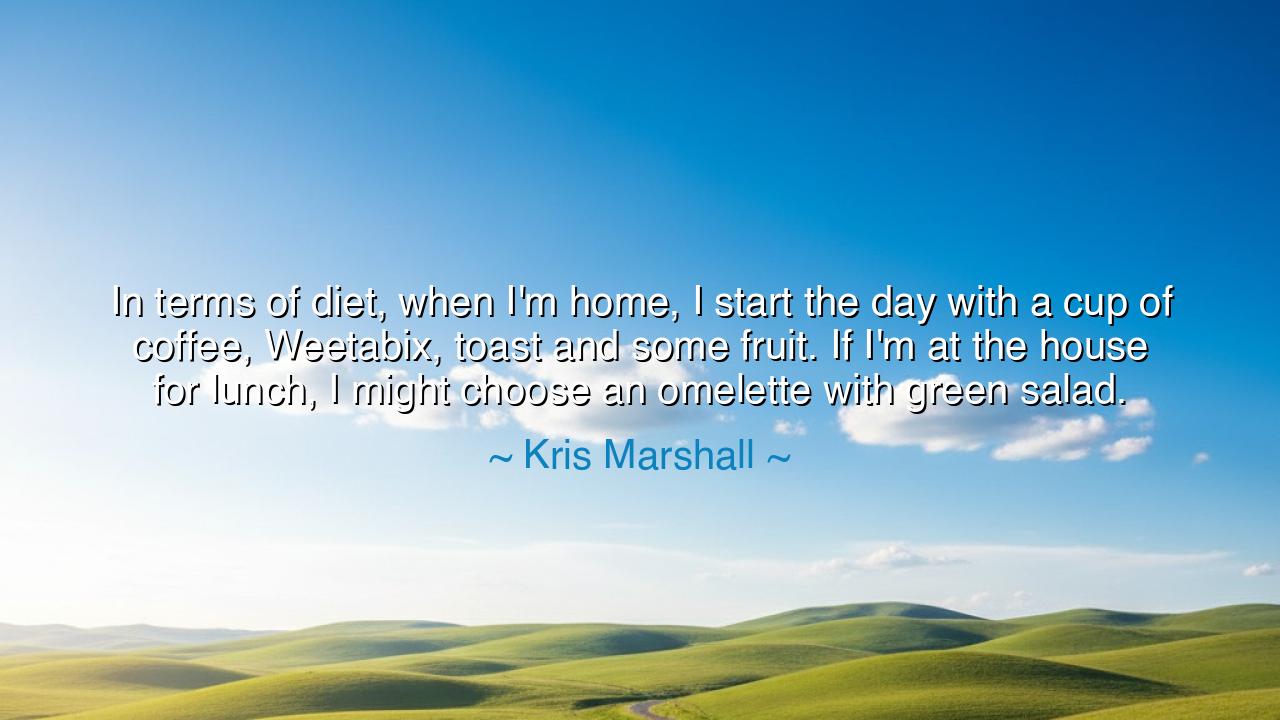
In terms of diet, when I'm home, I start the day with a cup of
In terms of diet, when I'm home, I start the day with a cup of coffee, Weetabix, toast and some fruit. If I'm at the house for lunch, I might choose an omelette with green salad.






When the actor Kris Marshall said, “In terms of diet, when I'm home, I start the day with a cup of coffee, Weetabix, toast, and some fruit. If I'm at the house for lunch, I might choose an omelette with green salad,” his words, though simple and domestic, reveal something far greater than the surface of routine. They speak to a timeless truth — that the art of living well is found not in excess or extremes, but in balance, simplicity, and rhythm. In an age of indulgence, where people seek miracles in pills and potions, Kris reminds us that wisdom often dwells in the ordinary. His modest meals are not about luxury or deprivation, but about harmony — the quiet mastery of daily life.
There is a certain poetry in beginning the day with a humble cup of coffee and fruit. These are not the feasts of kings, but the fare of the mindful — those who understand that the morning sets the tone for the soul. Coffee awakens not just the body but the spirit, stirring thought and movement. Weetabix and toast, the simplest of grains, remind us of the earth’s generosity, of the sustenance that asks little yet gives much. To start the day thus is to greet the dawn with gratitude, not greed; it is to practice contentment before ambition, to say to the world: “I have enough.”
Marshall’s omelette with green salad is more than a lunch — it is a symbol of moderation. The egg, rich in strength, has long been a symbol of life itself — the vessel of beginnings, the quiet cradle of potential. The greens beside it represent growth and renewal. Together they form a union of strength and gentleness, of nourishment without excess. This is not a meal of extravagance, but of wisdom disguised as simplicity. It teaches that one does not need opulence to live richly; one needs only to eat in a way that honors both the body and the earth.
In ancient times, the philosopher Epicurus taught that happiness was not found in abundance, but in the absence of want. He and his followers lived in gardens, eating bread, olives, and fruit, finding joy in simplicity and conversation. To them, food was not indulgence but communion — with nature, with one another, and with the self. Kris Marshall’s reflection carries the echo of that same ancient voice. It is a modern whisper of Epicurus’s garden, reminding us that the measure of a man is not in the richness of his table, but in the peace that follows his meal.
The origin of this quote lies not in a doctrine of nutrition, but in a philosophy of grounded living. Marshall, a man often between worlds — between sets, between roles, between countries — finds stability in the ordinary. His food becomes his ritual, his home his sanctuary. It is a lesson in presence: when life moves fast, the simplest acts — preparing breakfast, brewing coffee, choosing fruit — can root the soul in stillness. The ancients would call this mindfulness, the act of being awake to the sacred within the mundane.
From his words, we may draw a deeper lesson. The diet he describes is not merely about food; it is about balance in all things. To eat light, to move often, to take pleasure without overindulgence — these are the ways to preserve both body and spirit. It is a truth as old as civilization: that health is not purchased, but cultivated; not found in complexity, but born of discipline and gratitude. The man who honors small routines builds a fortress against chaos. The one who eats with intention learns to live with intention.
Thus, let us take Kris Marshall’s humble meals as a parable for life itself. Begin each day with simplicity; take joy in nourishment rather than novelty. When you eat, do so with awareness; when you work, do so with focus; when you rest, do so without guilt. The world will always tempt you with more — more flavors, more distractions, more noise — but the wise know that contentment is the highest form of wealth.
So, children of the modern age, remember this: it is not the banquet that feeds the soul, but the quiet meal taken in peace. Follow the rhythm of Kris Marshall’s words — a balanced breakfast, a wholesome lunch, and a life that needs nothing extravagant to feel full. For in the discipline of simplicity lies the freedom of abundance, and in the ordinary acts of care, the extraordinary beauty of being alive.






AAdministratorAdministrator
Welcome, honored guests. Please leave a comment, we will respond soon